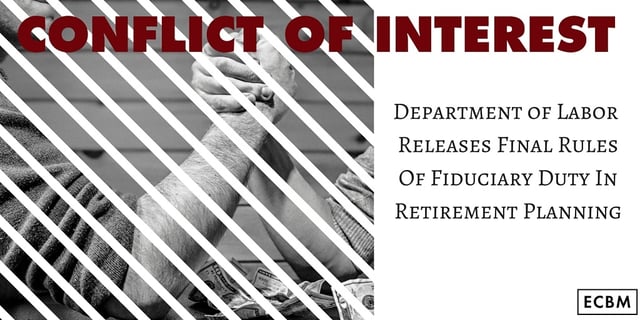
After more than five years of work, the Department of Labor finally released its final rule redefining the concept of fiduciary duty in the context of retirement planning advice. The new rule, replacing standards that have been in place since 1975, comes with a significant amount of controversy. Republicans in Congress have made their unhappiness with the new rule clear and the Securities and Exchanges Commission, who have their own, separate definition of fiduciary duty and the circumstances in which it applies, have expressed their own concerns with the effect of the DOL rule.
Avoiding Conflicts Of Interest
The major change in the rule now applies fiduciary duties to any advisor who makes a recommendation to a plan sponsor or participant. Fiduciary duties mean that retirement advisors must avoid conflicts of interest and provide advice that’s in the best interests of the client. No one really knows what the best interests of the client standard will look like in practice yet, but it will probably provide incentive for investment advisors to avoid higher fee index funds.
Clarification Was Needed For Investors
The rule makes a distinction between specific investment advice and “educational” or marketing materials. Investment advisors are still allowed to market themselves to consumers of retirement investment services and host educational seminars meant to inform plan holders on their options. The easiest way to conceptualize this is by making a distinction between generalized advice and individualized advice. The rule only aims to change conduct with respect to individualized advice.
READ MORE: ERISA AND THE CONTINUED CONTROVERSY OF 401KS AND IRAS
Best Interest Contracts
The main target of the rule is conflicts of interest, where the adviser may receive a higher commission by recommending certain financial products. So advice that results in the advisor earning a higher fee becomes much more difficult to give, even if it may in some circumstances yield a better result for the client because it potentially significantly increases the risk of a lawsuit. The law does allow for best interest contract exemptions, a document plan providers and participants can sign that allows advisors to receive compensation that might create a conflict of interest so long as they adhere to impartial conduct standards. Those standards mostly revolve around the best interest standards for advice, avoiding unreasonable compensation, and not making misleading statements to investors.
Change Won't Be All At Once
Ultimately, the Department of Labor did relent on some of the more aggressive elements of their original proposed rule. As one example, they removed a provision of the law that would have required advisors to violate Securities and Exchanges Commission rules by forecasting the growth of specific assets. The rule provides a more gentle timeline for bringing old plans into compliance with the new standard than originally contemplated, too. Some commentators see the rule change as doing little more than codifying trends in investor advice that started to happen in the market over five years ago.
In the end, these new standards will directly impact many plan participants and plan providers. If nothing else, they will definitely increase the paperwork plan providers have to sift through. Companies providing ERISA plans to their employees should start examining their investment advisor relationships now to see how these changes will affect them.

